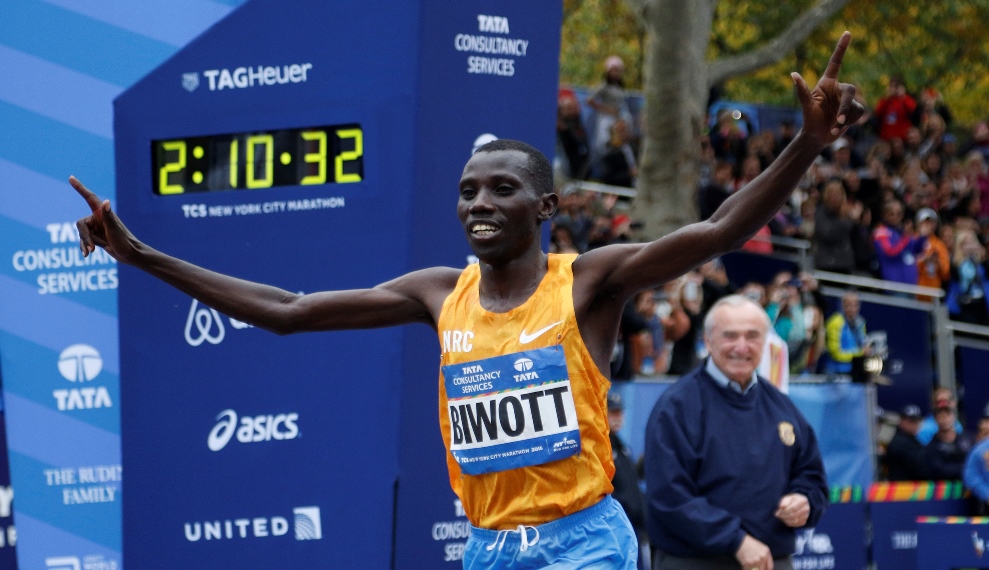David Monti, @d9monti
(c) 2016 Race Results Weekly, all rights reserved
(24-Jun) — Stanley Biwott was only 22 when he watched Kenyan compatriot Samuel Wanjiru on television win the 2008 Olympic Marathon in Beijing, still the only Olympic Marathon gold medal earned by a Kenyan. Biwott, who will run his first Olympic Marathon in Rio de Janeiro in August, was thrilled by Wanjiru’s bold, front-running style and his total domination of that race. He wondered: could that be me someday?
“Yes, I watched from the start,” Wanjiru told Race Results Weekly via Skype yesterday, speaking from Olomouc in the Czech Republic where he will run the Mattoni Olomouc Half-Marathon tomorrow. “It was an interesting race. Certainly, when I saw Sammy running in the Beijing Olympics, I was feeling that one day, one time, I would represent my country. This is my time.”
Biwott was a little-known athlete eight years ago, and hardly seemed destined for marathon greatness. Under the tutelage of Italian coach Dr. Gabriele Rosa since 2006, Biwott has risen through the ranks of second-tier marathons to become a force in the sport’s premier league, the Abbott World Marathon Majors (AbbottWMM). He got his first AbbottWMM start in 2013, finishing fifth in the TCS New York City Marathon. He had a breakthrough race at the Virgin Money London Marathon the following spring, finishing second to Wilson Kipsang in a personal best 2:04:55. That set the stage for a succession of excellent performances in 2015 where he took fourth at London (2:06:41) and first at New York (2:10:34), his first AbbottWMM victory.
“When I won the New York Marathon, my life changed completely,” Biwott said. “As you know, New York is a great marathon. I continue to run, to get better in the marathon.”
Lining up at the Virgin London Marathon last April, Biwott knew his performance would determine whether he was selected by Athletics Kenya for the Rio Olympic Marathon. Late in the race, he was the only man able to hold the scorching pace of eventual champion Eliud Kipchoge, as the pair stormed through 30 kilometers in a world record 1:27:13. Biwott would eventually have to let go of Kipchoge –who ran the second-fastest time ever on a record-standard course (2:03:05)– but his runner-up finish of 2:03:51 locked in his selection for the Kenyan Olympic Team and put him in the ultra exclusive nine-man sub-2:04 marathon club. Since then, he has thought of little else besides Rio as he logs 30 kilometers a day in Kapsabet, Kenya.
“I think when Athletics Kenya selected us, I hoped that I would win a medal,” said Biwott. “As a team we sill do our best. So we are training hard and focusing on Rio.”
Tomorrow in Olomouc, the picturesque capital city of Moravia, Biwott will put that training to the test. He said that he is ready to run fast (if the weather isn’t too hot), and that he will treat Saturday’s contest as a full-out race, not a tempo run. The course record is 60:17 by Kenya’s Geoffrey Ronoh set in 2014.
“I’m in good shape and ready to run this half-marathon,” he said. “This part of my preparations. I also tested the weather what Rio will be like. It’s a little bit hot, so I have to get used to it.” He added: “This is a race; it’s not training. I hope the race will be fast.”
Also yesterday, Biwott was pleased that Kenyan president Uhuru Kenyatta had signed an amended anti-doping bill into law, bringing Kenya still closer to full compliance with World Anti-Doping Agency guidelines. As a top athlete in the AbbottWMM, Biwott is regularly tested as part of that organization’s special drug-testing program which is jointly operated with the IAAF.
“Yes, I saw in the media,” Biwott said. “That’s a good news. This is very serious. You have to train well. There is no shortcut in running.”
Earlier this week, the International Olympic Committee said that Kenyan and Russian athletes would be subject to additional testing before being allowed to compete in Rio. Biwott said that progress was being made against doping in Kenya, especially in educating athletes.
“When you talk of doping, education has been going in well in Kenya,” he said. “Athletes are aware in Kenya. Every athlete must know that doping is not good.”



